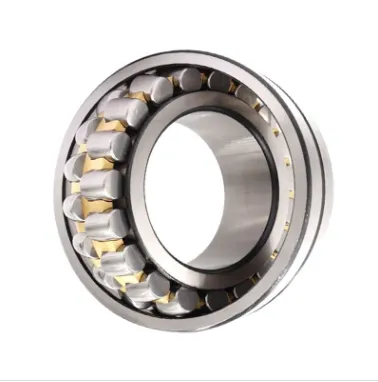সেপ্টে. . 09, 2024 17:42 ফিরে তালিকায়
A Brief Introduction of Spherical Bearings
Spherical bearings are a vital component in various industrial and mechanical applications. Their unique design allows for the accommodation of angular misalignment, making them essential in systems where there is relative motion between parts. This article delves into the characteristics, applications, and benefits of spherical bearings, providing a comprehensive understanding of why they are crucial in modern engineering.
What Are Spherical Bearings?
Spherical bearings are designed to handle both radial and axial loads, thanks to their spherical inner ring, which fits into a corresponding outer ring. This spherical interface allows the bearing to pivot within the housing, accommodating angular misalignments that can occur due to shaft deflection, mounting errors, or other mechanical issues. Unlike traditional bearings, which may only accommodate misalignment to a limited degree, spherical insert bearings are specifically engineered to address this challenge, ensuring smooth operation even under challenging conditions.
Key Applications of Spherical Bearings
Spherical bearings find use in a wide range of industries due to their ability to handle misalignment and load variability. Some of the most common applications include:
Automotive Industry: Spherical bearings are frequently used in suspension systems, steering linkages, and drivetrains. Their ability to handle both rotational and oscillating movements makes them ideal for automotive applications, where they contribute to the smooth operation and longevity of vehicles.
Aerospace Industry: In aerospace, spherical plain bearings are essential in flight control systems, landing gear, and other critical components. Their ability to accommodate misalignment ensures reliability and safety in aircraft operations, where precision and durability are paramount.
Industrial Machinery: Spherical bearings are widely used in industrial machinery, particularly in heavy-duty applications such as mining, construction, and manufacturing. Their robust design allows them to withstand harsh environments, high loads, and fluctuating conditions, ensuring the smooth operation of equipment.
Railway Systems: In railway systems, spherical bearings are employed in the suspension and bogie systems of trains. Their ability to handle dynamic loads and misalignment is crucial for maintaining the stability and safety of railway vehicles.
Benefits of Spherical Bearings
The advantages of spherical bearings are numerous, making them a preferred choice in various demanding applications. Some key benefits include:
High Load Capacity: Spherical bearings are designed to handle both radial and axial loads simultaneously, making them ideal for applications where multiple forces are at play.
Accommodation of Misalignment: One of the most significant advantages of spherical bearings is their ability to accommodate angular misalignment. This feature reduces the risk of premature wear and failure, ensuring the longevity of the bearing and the overall system.
Durability and Reliability: Spherical bearings are built to withstand harsh conditions, including high temperatures, heavy loads, and exposure to contaminants. This durability translates to reliable performance and reduced maintenance needs.
Smooth Operation: The design of spherical bearings allows for smooth operation even under challenging conditions, minimizing friction and wear, which in turn enhances the efficiency and performance of the machinery in which they are used.
Material Considerations for Spherical Bearings
The material used in the construction of spherical bearings plays a critical role in their performance and durability. Common materials include:
Steel: Steel is a popular choice for spherical bearings due to its strength, durability, and ability to withstand high loads and temperatures. It is often used in applications where heavy-duty performance is required.
Bronze: Bronze bearings are known for their excellent wear resistance and ability to operate in environments with limited lubrication. They are often used in applications where corrosion resistance is essential.
Polymer Composites: In certain applications, polymer composite materials are used to manufacture spherical bearings. These materials offer advantages such as lightweight construction, low friction, and resistance to corrosion and chemical exposure.
Maintenance and Care of Spherical Bearings
Proper maintenance is crucial to ensuring the longevity and performance of spherical bearings. Regular inspection and lubrication are essential to prevent wear and extend the life of the bearing. Some maintenance tips include:
Regular Lubrication: Ensuring that spherical bearings are adequately lubricated is essential to reducing friction and wear. Depending on the application, bearings may require grease or oil lubrication.
Inspection for Wear: Regularly inspecting spherical bearings for signs of wear, such as pitting, corrosion, or excessive play, can help identify potential issues before they lead to failure.
Replacement When Necessary: Even with proper maintenance, spherical bearings will eventually reach the end of their service life. Replacing bearings at the appropriate time can prevent unexpected downtime and costly repairs.
Xingtai Botong Machinery Technology-Your Reliable Spherical Bearing/Roller Manufacturer
Spherical bearing/roller play a vital role in industrial field. Only by purchasing from trustworthy manufacturers can the quality and precision be guaranteed. Xingtai Botong Machinery Technology Co., Ltd.is a leading manufacturer of Spherical bearing/roller in China, With many years of industry experience and excellent reputation, is able to be come your reliable supplier. Contact us now to get more information.

সর্বশেষ সংবাদ
-
spherical-bearings-enabling-bionic-joint-over-rotation
খবরAug.22,2025
-
stainless-steel-sphericals-botongs-harsh-environment-heroes
খবরAug.22,2025
-
spherical-roller-thrust-bearings-for-space-elevator-anchors
খবরAug.22,2025
-
axial-spherical-roller-bearing-xingtais-motion-architects
খবরAug.22,2025
-
ceramic-coated-bearings-for-fusion-reactor-plasma-whirlpools
খবরAug.22,2025
-
botongs-zirconia-bearing-defying-metal-limits
খবরAug.22,2025